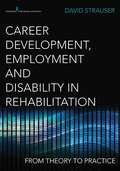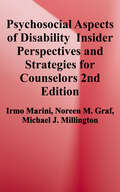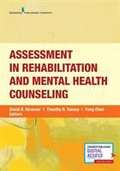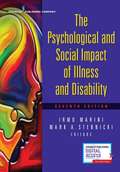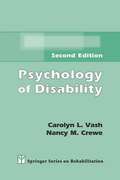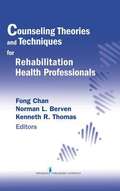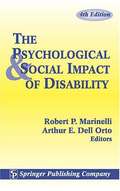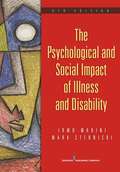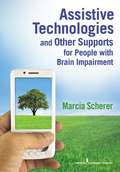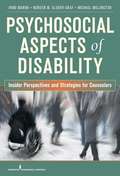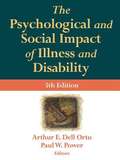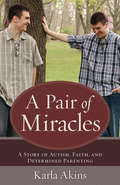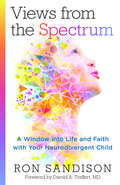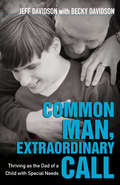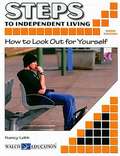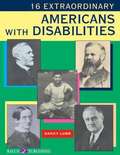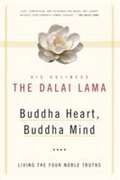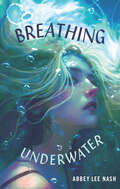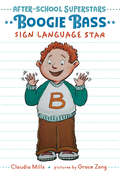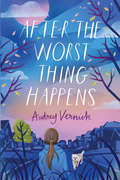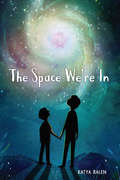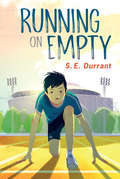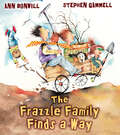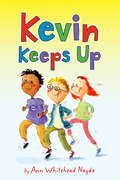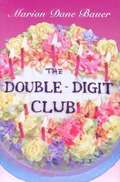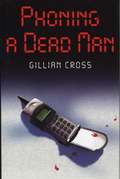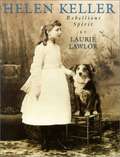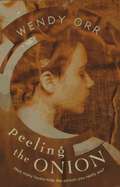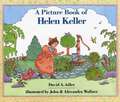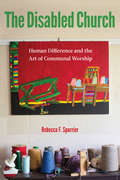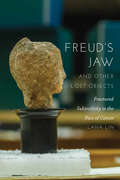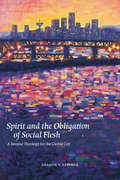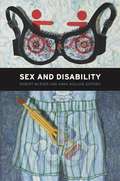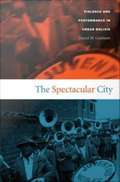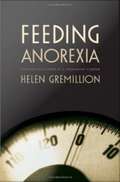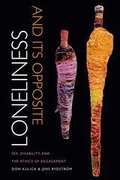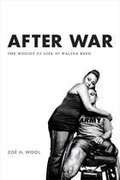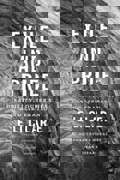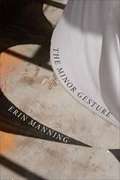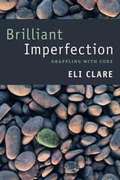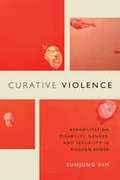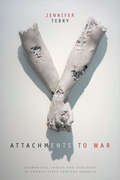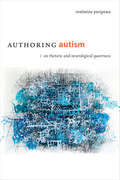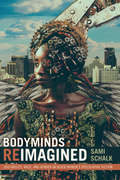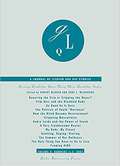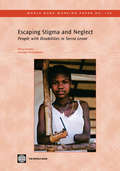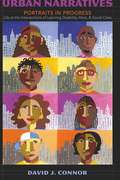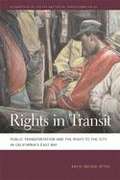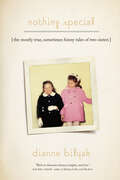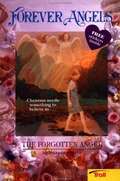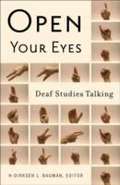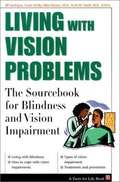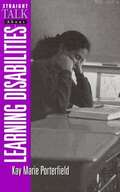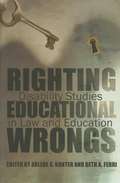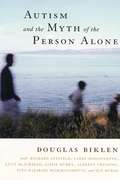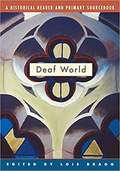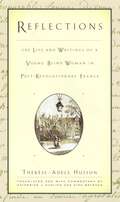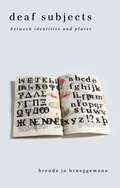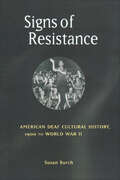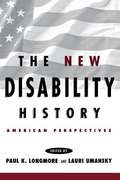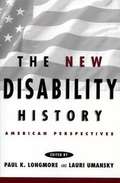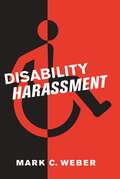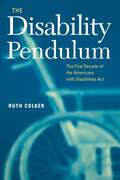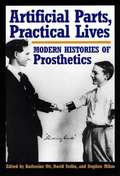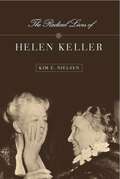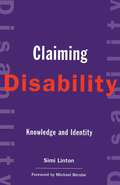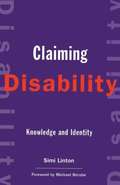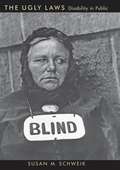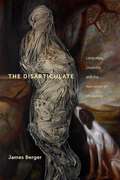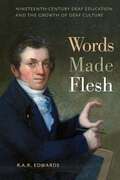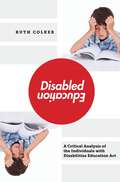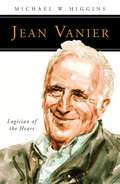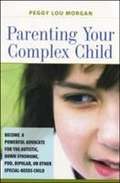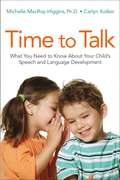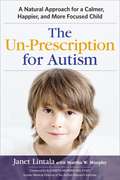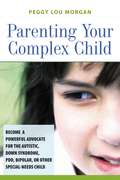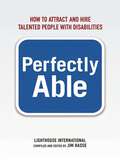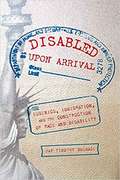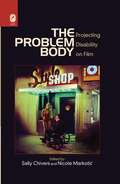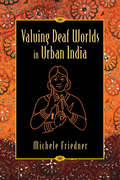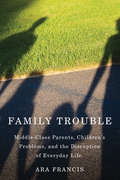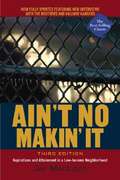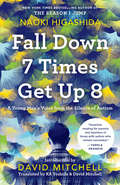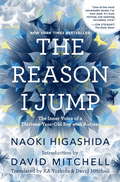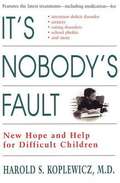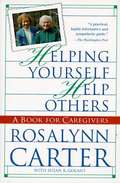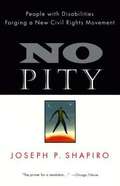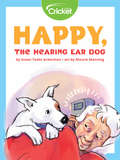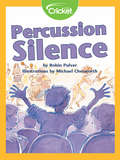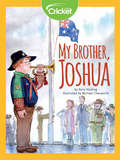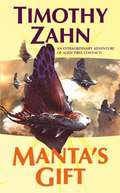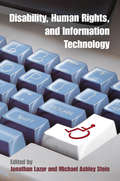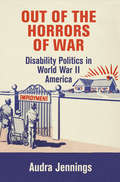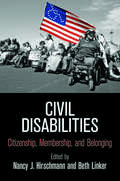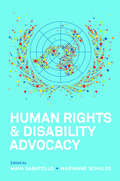Career Development, Employment, and Disability in Rehabilitation: From Theory to Practice
by David Strauser<p>This text provides, from a rehabilitation perspective, comprehensive coverage of the dominant theories and techniques related to the occupational development, vocational behavior, and the organizational factors that impact the career development and employment of individuals with disabilities. It is designed for the CORE-mandated required course on employment and career development for the Master's Degree in rehabilitation counseling and for Licensed Professional Counselor certification. As the only book in rehabilitation and counseling that broadly addresses career development and employment of individuals with disabilities, it is a major contribution to the literature. <p>Topics covered include major constructs in career development and employment of disabled individuals, theoretical foundations, occupational assessment, information and evaluation, intervention strategies, and populations and settings. To facilitate learning and promote application of theories and techniques, each chapter includes chapter objectives, discussion and review questions, and case studies. An instructor's manual is also included.</p>
Psychosocial Aspects of Disability: Insider Perspectives and Strategies for Counselors
by Irmo Marini Noreen M. Graf Michael J. MillingtonWhat are the differences between individuals with disabilities who flourish and those who never really adjust after a trauma? How do those born with a disability differ from individuals who acquire one later in life? <p><p>Fully updated and revised, this second edition of a unique rehabilitation counseling text reflects growing disparities among "haves" and "have-nots" as they bear on the psychosocial aspects of disability. New content focuses on returning veterans afflicted with physical and mental health problems, persons with disabilities living in poverty, and the need for increased family and community-based engagement. The book provides updated information about assisted suicide, genetic testing, new legislation, and much more. <p><p>Using a minority model perspective, the text provides students and practitioners of rehabilitation and mental health counseling with vivid insight into the experience of living with a disability. It features first-person narratives from people living with a variety of disabling conditions, which are integrated with sociological and societal perspectives toward disability, and strategies for counseling such individuals. The text encompasses a historical perspective, psychological and sociological research, cultural variants regarding disability, myths and misconceptions, the attitudes of special interest and occupational groups, the use of positive psychology, and adjustments to disability by the individual and family. A wealth of counseling guidelines and useful strategies is geared to individuals with specific disabilities. Designed for a 15-week semester, the book also includes thought-provoking discussion questions and exercises.
Medical Aspects of Disability: A Handbook for the Rehabilitation Professional
by Myron G. Eisenberg Robert L. Glueckauf Herbert H. ZaretskyA comprehensive guide to disabilities for rehabilitation professionals.
Assessment In Rehabilitation And Mental Health Counseling
by David R. Strauser Timothy N. Tansey Fong ChanThis graduate-level text on rehabilitation and mental health counseling disseminates foundational knowledge of assessment principles and processes with a focus on clinical application. Written by recognized leaders in rehabilitation and mental health, it is the only book to use the World Health Organization's International Classification of Functioning, Disability and Health (ICF) framework to integrate assessment tools and techniques addressing practice with varied populations and settings. <p><p> Written by leading practitioners with specialized knowledge, chapters focus on specific populations and service delivery settings. The book features a variety of learning tools to foster critical thinking, including learning objectives and case examples highlighting important principles and applications. Sample reports and templates further reinforce understanding of specific applications.
The Psychological and Social Impact of Illness and Disability
by Irmo Marini Mark A. StebnickiNow in its seventh edition, this bestselling classic continues to be the most comprehensive and diverse text available on the psychosocial aspects of illness and disability. It is substantially revised to reflect the growing disparity between the haves and the have-nots and incorporates social justice issues throughout the text. In addition to new and updated information integrated throughout the book, the seventh edition features two new chapters addressing social justice in regards to depression and disability, and the psychosocial aspects of grief, death, and dying. Additionally, the text now includes an Instructor’s Manual and PowerPoint slides. Combining a mix of seminal work from rehabilitation counseling legends with current theoretical and treatment approaches, the book provides a practical, real-life perspective and offers broad and inclusive coverage of the day-to-day challenges of working with a diverse and marginalized population. Additionally, the text analyzes barriers to enabling patients with disabilities and improving their quality of life. Chapter objectives, review questions, and personal narratives in each chapter facilitate in-depth learning.
Family Interventions Throughout Chronic Illness and Disability
by Paul W. Power Martha Blechar Gibbons Arthur E. Dell OrtoTextbook covering a wide range of disabilities and chronic illnesses. Intended for health, allied health, and other helping professionals.
Psychology of Disability (2nd edition)
by Carolyn L. Vash Nancy M. CreweThe latest edition, 20 years after the first, incorporates the many changes that have occurred in disability-related language, legislation, technology, and research. Its two sections focus first on the disability experience a chronicle of what it's like to be disabled and how objective and subjective experiences affect the basic functions of living, working, and playing and then on interventions a response to the problems and sources of psychological pain exposed by the discussions in the first section. Vash (a writer and consulting psychologist in Altadena, Calif. ) and Crewe (Michigan State U. ) see their work as both a textbook or collateral reading source for those studying the psychological aspects of disability, and a general resource for rehabilitation professionals.
Counseling Theories and Techniques for Rehabilitation Health Professionals
by Fong Chan Norman L. Berven Kenneth R. ThomasForty-three American academics and practitioners discuss the dominant theories and techniques of counseling and psychotherapy from a rehabilitation perspective. Coverage includes reviews of ten psychodynamic, humanistic, and cognitive and behavioral approaches to counseling; basic techniques; considerations for specific types of disabilities; and professional issues. Each chapter includes a case example. Annotation ©2004 Book News, Inc., Portland, OR (booknews.com)
Counseling Theories and Techniques for Rehabilitation Health Professionals
by Kenneth R. Thomas Norman L. Berven Fong ChanForty-three American academics and practitioners discuss the dominant theories and techniques of counseling and psychotherapy from a rehabilitation perspective. Coverage includes reviews of ten psychodynamic, humanistic, and cognitive and behavioral approaches to counseling; basic techniques; considerations for specific types of disabilities; and professional issues. Each chapter includes a case example.
The Psychological And Social Impact Of Disability
by Robert P. Marinelli Arthur E. Dell OrtoMarinelli and Dell Orto continue the premise of their earlier editions of this widely adopted text and present a realistic perspective on disability. Carefully selected articles and personal narratives capture the unique aspects of the psychological and social effects of disability. Formatted to include thought-provoking study questions and disability awareness exercises, this text is recommended for students in rehabilitation counseling and physical therapy education programs, as well as professionals in rehabilitation, psychology, and social work.
The Psychological and Social Impact of Illness and Disability (Sixth Edition)
by Irmo Marini Mark StebnickiExamines current thought and treatment approaches in working with individuals with disabilities. Abundant and insightful narratives by disabled individuals offer a bridge between theory and practice for students in rehabilitation psychology and counselling courses.
Assistive Technologies and Other Supports for People With Brain Impairment
by Marcia J. SchererAssistive Technologies and Other Support for People with Brain Impairment, by Marcia J. Scherer, is a must-have text for academic instructors and their students. The author's synopsis of brain impairment, current rehabilitation strategies, available assistive technologies and resources, as well as the practical merging of the above, makes this an invaluable addition to any academic program in cognitive rehabilitation. This book gives a clear and detailed overview of how the brain reacts to impairment and gives illustrated examples of effective integration of AT into the lives of people with cognitive disability. Integrating current research with the experiences of people with cognitive disabilities, this volume examines how assistive and cognitive support technologies are being harnessed to provide assistance for thinking, remembering, and learning. The book vividly describes real-life situations in which cognitively impaired individuals use assistive supports and the advantages and limitations these individuals perceive from their use. It provides information on how cognitively impaired individuals and their families and caregivers can select the most appropriate technologies from a wide array of accommodations and resources, including individualized protocols of different forms of support to facilitate optimal functioning. The text offers practitioners a comprehensive and systematic process for ensuring their clients' effective application and utilization of this technology. This book will also provide insight for users of assistive technology and their families and caregivers to ensure optimal technology use.
Psychosocial Aspects of Disability: Insider Perspectives and Counseling Strategies
by Irmo Marini Noreen M. Glover-Graf Michael Jay MillingtonWhat a marvelous and amazing textbook. Drs. Marini, Glover-Graf and Millington have done a remarkable job in the design of this highly unique book, that comprehensively and very thoughtfully addresses the psychosocial aspects of the disability experience. These highly respected scholars have produced a major work that will be a central text in rehabilitation education for years to come. From the Foreword by Michael J. Leahy, Ph. D. , LPC, CRC Office of Rehabilitation and Disability Studies Michigan State University This is an excellent book, but the best parts are the stories of the disabled, which give readers insights into their struggles and triumphs. " Score: 94, 4 Stars--Doody's Medical Reviews What are the differences between individuals with disabilities who flourish as opposed to those who never really adjust after a trauma? How are those born with a disability different from individuals who acquire one later in life? This is the first textbook about the psychosocial aspects of disability to provide students and practitioners of rehabilitation counseling with vivid insight into the experience of living with a disability. It features the first-person narratives of 16 people living with a variety of disabling conditions, which are integrated with sociological and societal perspectives toward disability, and strategies for counseling persons with disabilities. Using a minority model perspective to address disability, the book focuses on historical perspectives, cultural variants regarding disability, myths and misconceptions, the attitudes of special interest and occupational groups, the psychology of disability with a focus on positive psychology, and adjustments to disability by the individual and family. A wealth of counseling guidelines and useful strategies are geared specifically to individual disabilities. Key Features: Contains narratives of people living with blindness, hearing impairments, spinal cord injuries, muscular dystrophy, polio, mental illness, and other disabilities Provides counseling guidelines and strategies specifically geared toward specific disabilities, including "dos and don'ts" Includes psychological and sociological research relating to individual disabilities Discusses ongoing treatment issues and ethical dilemmas for rehabilitation counselors Presents thought-provoking discussion questions in each chapter Authored by prominent professor and researcher who became disabled as a young adult
The Psychological and Social Impact of Illness and Disability (5th Edition)
by Paul W. Power Arthur E. Dell OrtoThis collection, which defines disability very broadly to include post-traumatic stress and normal aging, includes classic articles and discussion questions as well as new material on illness. With a few exceptions it concentrates on the needs of caregivers and those who seek to rehabilitate people with disabilities. Therefore articles cover such issues as definitions of disability and current or past models, shifts in expectations of care demanded by the disabled, perceptions of stages of adjustment to disability, differences in the experience of men and women, the difficulties in discerning the quality of life from outside disability, sexuality, methods of intervention and treatment to promote acceptance o a disability, family issues surrounding life and death, special resources such as assistive technology and spirituality, new applications of eugenics and euthanasia, and "quality aging." Includes exercises and narratives about disability, primarily by caregivers.
Pair of Miracles, A: A Story of Autism, Faith, and Determined Parenting
by Karla Akins"A parent's gripping journey of awareness, acceptance, and appreciation of her two boys dealing with significant challenges brought on by autism."--Stephen Mark Shore, EdDWhen Karla Akins hoped that her autistic sons could learn to read and function independently, doctors warned her that those expectations would never be met. She set out to prove that, despite those warnings, all things are possible through God.Laced with humor and compassion, A Pair of Miracles is the heartwarming story of her journey rearing adopted twin sons, each diagnosed with autism and fetal alcohol disorder. This is more than a moving biography from a mom on the front lines, however. It is a powerful tool, full of practical help for parents, educators, and church members working with children who have intellectual disabilities, speech impairments, and other limitations on the autism spectrum. It is also a challenge to the church to welcome and celebrate all the members of their congregation, no matter their abilities.Thanks to Karla's determination, faith, and unconditional love--and contrary to the doctors' predictions--her adult twins are now able to function independently in many ways. They help their dad install pools, do carpentry work, and serve in the church as ushers, sound engineers, and children's ministry workers.For parents seeking hope, answers, and peace, Karla leads the way to all three down a path she's already been.
Views from the Spectrum: A Window into Life and Faith with Your Neurodivergent Child
by Ron SandisonA remarkable inside look at the intersection of faith and autism for parents longing to connect their children with God's loveRaising a child with autism is both a challenge and an adventure--and sometimes parents need to know there can also be wonderful potential for blessings. Views from the Spectrum shares the inspiring stories of twenty amazing young adults with autism and how each of their family's unwavering support and faith in God led them to accomplish what was thought impossible. As a thriving adult with autism himself, Ron Sandison is determined to educate the world on the gifts and talents autism can cultivate--even when they differ from our expectations of typical success.While it is primarily a much-needed how-to guide for parents of children with special needs, this book is also a stunning view into the world of autism. Readers will witness the courage of Tyler Gianchetta, who rescued his mother from a burning vehicle. They'll marvel at the artistic talent of nonverbal poet and artist Kimberly Dixon, admire the determination of Armani Williams, competing as a NASCAR driver, and find encouragement in the many other stories within these pages. In addition to these experiences, Sandison has also interviewed top experts in the autism field and shares their insights here.Sandison weaves narrative with Scripture, sharing his own journey with autism throughout the book. Full of anecdotes, scientific research, parenting tips, prayers, devotions, and more, Views from the Spectrum is a celebration of autism, faith, and the possibilities at their intersection.
Common Man, Extraordinary Call: Thriving as the Dad of a Child with Special Needs
by Jeff Davidson Becky DavidsonChallenges, equips, and inspires fathers of children with special needsBecoming the father of a child with special needs can feel like being drafted into the military--and starting duty as a general. Dad is expected to know how to set rules and run drills without any training in leadership. And there are very few resources for men who want to be involved but need guidance and specific ideas. Overwhelmed, many fathers end up going AWOL on their families.As a twenty-year veteran of special-needs parenting, Jeff Davidson wrote a field manual to give fathers the skills required for the day-to-day demands of parenting. Jeff helps men discover God's new mission for their lives in each of five specific roles: warrior, protector, provider, encourager, and equipper. He offers rich, real-life examples from dads in the field and a no-nonsense approach from initial diagnosis onward. This book is filled with practical how-tos for parenting in the special needs world, bullet points for easy reading and quick reference, and a Mission Critical synopsis at the end of each chapter.Informal and task-oriented, Common Man, Extraordinary Call offers growth and hope for men with little free time. And as they process their instructions, they'll be able to mentor other fathers, creating a strong army of men who not only survive but thrive as capable dads to their children with special needs.
Steps To Independent Living: How To Look Out For Yourself
by Nancy LobbCompletely updated, part of the best-selling series that shows students how to take care of themselves and face the challenges of everyday living. Explains essential tasks and responsibilities at a manageable reading level, with demonstrations, activities, illustrations, self-tests and comprehension checks throughout the text. "How to Look Out for Yourself " focuses on staying emotionally healthy, keeping personally safe, and making wise decisions about alcohol, drugs, tobacco, and sexual activity.
16 Extraordinary Americans With Disabilities
by Nancy LobbMillions of Americans have some type of disability, some are easy to the eye others are invisible. This book is a collection of stories from 16 Americans with disabilities that have made a difference in the history of the United States.
Buddha Heart, Buddha Mind: Living the Four Nobel Truths
by Dalai Lama Xiv Jigme Rinpoche Robert R. BarrThree Years ago, before thousands of people at the Institute Karma Ling in Savoie, France, the Dalai Lama held a series of presentations expounding on the Four Noble Truths of the Buddha. All Buddhist traditions are rooted in this first enunciation of the teaching (dharma) of the Buddha, which speaks about the reality of suffering, its origin, the opportunity for every person to be healed of suffering, and the practical aspects of this therapy of soul, body, and mind. With wisdom and insight, the Dalai Lama revisits these fundamental truths of Buddhism, and shows us their universal value. His commentary, at once traditional and daring, rational and mystical, ever centered on experience, gives us reason to understand why this exceptional being is called the "Ocean of Wisdom."
Breathing Underwater
by Abbey Lee NashWith one word, Tess&’s world could be completely undone: Epilepsy.Tess lives for swimming: the feel of the pool's rough edge on her toes, the snap of cold water on her skin, and the push of her limbs ever forward. In the water, she&’s truly alive. Until tragedy strikes. And Tess is left navigating a summer of doctor visits, missed swim practices, a newly distant best friend, and a job stuck behind a counter—not sitting high in the lifeguard chair like every season before.Instead, her spot goes to new guy Charlie. Although his messy hair and laid-back demeanor catch Tess&’s attention, this isn&’t really the time. She&’s got to focus on getting back in the pool—and on getting back to herself.Lyrically and sensitively written, Breathing Underwater is a slice-of-life story with depth, exploring topics like epilepsy, inclusivity in student athletics, changing friendships, and the power of love and community. With warmth and wit, Abbey Lee Nash has crafted a moving portrait of a teen girl&’s journey to self-acceptance and life on her own terms.A Junior Library Guild Gold Standard Selection
Boogie Bass, Sign Language Star (After-School Superstars #4)
by Claudia MillsBoogie Bass feels like he can't do anything right, but when he joins an after-school American Sign Language club, he turns out to be a natural!The After-School Superstars--Nixie Ness, Vera Vance, Nolan Nada, and Boogie Bass--are back in a new after-school adventure starring Boogie. He is clumsy and goofy, but now that he is at the American Sign Language camp at his school, he finds his hidden talent. He may not believe in himself, but the rest of his class does, especially when they visit a school for the Deaf and Boogie leads the way with his exuberant personality helping students to learn about each other and make new friends. Vetted by an expert from Gallaudet University and complete with additional material full of facts about American Sign Language, Boogie Bass is an excellent addition to The After-School Superstar series. Each book features recurring characters and highlights one activity they do at their after-school program, along with illustrations in black and white. The series is perfect for fans of Judy Moody, Ivy and Bean, and Clementine. A Junior Library Guild Gold Standard Selection Praise for Nixie Ness: Cooking StarA Junior Library Guild Gold Standard Selection "Young readers will easily relate to this wholesome look at early friendships and conflicts."--School Library Journal "Likeable Nixie creates a terrific recipe for winning back old friends and making lots of new ones."--Kirkus Reviews Praise for Vera Vance: Comics StarA Junior Library Guild Gold Standard Selection"Vera's shyness will be appreciated and understood by many readers . . . and the lovely wrap-up shows how every personality type and situation can find a way to use their strengths to reach their goals."--Kirkus Reviews "Budding artists will appreciate the respect for and information about the comics process and relate to Vera's joy at immersing herself in her beloved pastime." --The Bulletin of the Center for Children's Books
After the Worst Thing Happens
by Audrey VernickLeft reeling after her thoughtless mistake causes a terrible accident, 12-year-old Army Morand channels her grief to help someone in need.Army Morand feels like her life has been blown to bits when the worst thing imaginable happens--her beloved dog dies. It was an accident, but it was also Army's fault. She can't seem to stop hiding from everything and everybody including her best friend JennaLouise. But then Army sees Madison, the little girl who moved in across the way, climbing a tree and walking down the street unsupervised. Her family is not neglectful, just overwhelmed. Army finds herself overcome with the need to help Madison's family to make sure another worst thing doesn't happen--which becomes even more challenging when a big storm threatens her town.After the Worst Thing Happens is a bittersweet story about a girl surprised by the force of a growing need inside her to reach out and lend a hand while trying to escape the swirling sadness of her own sudden loss. In the end, it is about finding love and hope and friendship in very surprising places.
The Space We're In
by Katya BalenTen-year-old Frank has trouble navigating his relationship with his younger brother Max who is autistic.Frank loves soccer, codes, riding his bike, and playing with his friends. His brother Max is five. Max only eats foods that are beige or white, hates baths, and if he has to wear a t-shirt that isn't gray with yellow stripes he melts down down down. Frank longs for the brother he was promised by his parents before Max was born--someone who was supposed to be his biggest fan, so he could be the best brother in the world. Instead, Frank has trouble navigating Max's behavior and their relationship. But when tragedy strikes, Frank finds a way to try and repair their fractured family and in doing so learns to love Max for who he is. In her debut novel, Katya Balen uses her knowledge of autism and experience working with autistic people to create an intriguing and intense yet always respectful family story.For readers of Counting by 7s and The Curious Incident of the Dog in the Nighttime.A Junior Library Guild Selection!
Running on Empty
by S. E. DurrantA boy shoulders great responsibility for his differently abled parents in this touching middle-grade story.CJ is a runner--and when he's running, he's fast, free, and flying. It was Grandad who taught him to run, and who did a lot more, besides. Grandad always made sure things were in order around CJ's house, because his parents could not. CJ's parents are different, and because they do not have the tools to cope with certain elements of everyday life, it was Grandad who reviewed the water bill, saw to it that the electricity meter had funds, and kept everything else shipshape. But now, with Grandad's sudden passing and Aunt Joan about to have a baby, CJ knows it's up to him to make sure Mum and Dad are okay and to keep the household going. It would be a hard job for any adult, but for a kid who's also starting middle-school and trying to impress the gruff track coach . . . is staying afloat even possible? Through its heartwarming and believable characters, Running on Empty sensitively explores the dynamics of a loving family finding its way forward, and the unexpected helping hands that pitch in along the way.
The Frazzle Family Finds a Way
by Ann BonwillEvery member of the Frazzle family is disastrously forgetful. Mr. Frazzle forgets his trousers. Wags the dog can't find his bone, and Annie and Ben bring fishing poles and towels to school instead of their homework. Not even Aunt Rosemary with her organizational tips can help. But one day Annie has an idea that combines rhyme, recall, and song into a melodic way to remember in this warmheated tribute to compensating for weaknesses.
Kevin Keeps Up
by Ann Whitehead Nagda Chris RussoOh no! Beezer the Buzzard will be the sub while Mrs. Steele is away, and Kevin is going to be dead meat! When Mrs. Steele goes on an extended trip to Africa, Kevin knows he'll be stuck inside for every recess and have his desk moved to the front of the class. Mrs. Beezer just doesn't understand Kevin's problems with focusing and controlling his impulses. This charming chapter book takes a perceptive look at ADHD and the challenges it can present in school.
The Double-Digit Club
by Marion Dane BauerNine-year-old Sarah is excited about summer vacation, but she faces unexpected crises when her best friend Paige becomes old enough to join a local girls' clique, and when she makes choices which affect her relationship with an elderly blind neighbor.
Phoning a Dead Man
by Gillian CrossWhen John, a British demolition expert is supposedly killed blowing up a building, his fiancée Annie insists on investigating, despite being in a wheelchair, and John's teenage sister Hayley goes along and finds that the Russian Mafia is involved.
Helen Keller, Rebellious Spirit: The Life and Times of Helen Keller
by Laurie LawlorRecounting her mischievous nature, her little known romance, and her trials with her teacher and the public, this biography sheds new light on this extraordinary woman.
Peeling the Onion
by Wendy OrrTold in the first person, this is a detailed story of the physical and emotional difficulties 17-year-old Anna must struggle with as she recovers from a devastating automobile accident that, although she is alive and not paralyzed, destroys her dreams and her plans for her life
A Picture Book of Helen Keller
by David A. AdlerA brief biography of the woman who overcame her handicaps of being both blind and deaf.
The Disabled Church: Human Difference and the Art of Communal Worship
by Rebecca F. SpurrierHow do communities consent to difference? How do they recognize and create the space and time necessary for the differences and disabilities of those who constitute them? Christian congregations often make assumptions about the shared abilities, practices, and experiences that are necessary for communal worship. The author of this provocative new book takes a hard look at these assumptions through a detailed ethnographic study of an unusual religious community where more than half the congregants live with diagnoses of mental illness, many coming to the church from personal care homes or independent living facilities. Here, people’s participation in worship disrupts and extends the formal orders of worship. Whenever one worships God at Sacred Family Church, there is someone who is doing it differently.Here, the author argues, the central elements and the participation in the symbols of Christian worship raise questions rather than supply clear markers of unity, prompting the question, What do you need in order to have a church that assumes difference at its heart?Based on three years of ethnographic research, The Disabled Church describes how the Sacred Family community, comprising people with very different mental abilities, backgrounds, and resources, sustains and embodies a common religious identity. It explores how an ethic of difference is both helped and hindered by a church’s embodied theology. Paying careful attention to how these congregants improvise forms of access to a common liturgy, this book offers a groundbreaking theology of worship that engages both the fragility and beauty revealed by difference within the church. As liturgy requires consent to difference rather than coercion, an aesthetic approach to differences within Christian liturgy provides a frame for congregations and Christian liturgists to pay attention to the differences and disabilities of worshippers. This book creates a distinctive conversation between critical disability studies, liturgical aesthetics, and ethnographic theology, offering an original perspective on the relationship between beauty and disability within Christian communities. Here is a transformational theological aesthetics of Christian liturgy that prioritizes human difference and argues for the importance of the Disabled Church.
Freud's Jaw and Other Lost Objects: Fractured Subjectivity in the Face of Cancer
by Lana LinWhat does it mean to live with life-threatening illness? How does one respond to loss? Freud’s Jaw and Other Lost Objects attempts to answer these questions and, as such, illuminates the vulnerabilities of the human body and how human beings suffer harm. In particular, it examines how cancer disrupts feelings of bodily integrity and agency. Employing psychoanalytic theory and literary analysis, Lana Lin tracks three exemplary figures, psychoanalyst Sigmund Freud, poet Audre Lorde, and literary and queer theorist Eve Kosofsky Sedgwick. Freud’s sixteen-year ordeal with a prosthetic jaw, the result of oral cancer, demonstrates the powers and failures of prosthetic objects in warding off physical and psychic fragmentation. Lorde’s life writing reveals how losing a breast to cancer is experienced as yet another attack directed toward her racially and sexually vilified body. Sedgwick’s memoir and breast cancer advice column negotiate her morbidity by disseminating a public discourse of love and pedagogy. Lin concludes with an analysis of reparative efforts at the rival Freud Museums in London and Vienna. The disassembled Freudian archive, like the subjectivities-in-dissolution upon which the book focuses, shows how the labor of integration is tethered to persistent discontinuities.Freud’s Jaw asks what are the psychic effects of surviving in proximity to one’s mortality, and it suggests that violences stemming from social, cultural, and biological environments condition the burden of such injury. Drawing on psychoanalyst Melanie Klein’s concept of “reparation,” wherein constructive forces are harnessed to repair damage to internal psychic objects, Lin proposes that the prospect of imminent destruction paradoxically incites creativity. The afflicted are obliged to devise means to reinstate, at least temporarily, their destabilized physical and psychic unity through creative, reparative projects of love and writing.
Spirit and the Obligation of Social Flesh: A Secular Theology for the Global City
by Sharon V. BetcherDrawing on philosophical reflection, spiritual and religious values, and somatic practice, Spirit and the Obligation of Social Flesh offers guidance for moving amidst the affective dynamics that animate the streets of the global cities now amassing around our planet. Here theology turns decidedly secular. In urban medieval Europe, seculars were uncloistered persons who carried their spiritual passion and sense of an obligated life into daily circumambulations of the city. Seculars lived in the city, on behalf of the city, but—contrary to the new profit economy of the time—with a different locus of value: spirit. Betcher argues that for seculars today the possibility of a devoted life, the practice of felicity in history, still remains. Spirit now names a necessary “prosthesis,” a locus for regenerating the elemental commons of our interdependent flesh and thus for cultivating spacious and fearless empathy, forbearance, and generosity. Her theological poetics, though based in Christianity, are frequently in conversation with other religions resident in our postcolonial cities.
Theories of Illness: World Survey
by George Peter MurdockTheories of Illness establishes a new landmark in comparative studies. Utilizing concepts from modern medicine and anthropological theory, Professor Murdock distinguishes the natural causes of illness from theories of supernatural causation. He subdivides the latter into theories of illness that are related to aggression (witchcraft, sorcery, and spirit aggression) and those which are related to guilt and a sense of sin (taboo violation and mystical retribution). Obviously, these relate to man's most basic beliefs as revealed in early religions.
Sex and Disability
by Robert Mcruer Anna MollowThe title of this collection of essays, Sex and Disability, unites two terms that the popular imagination often regards as incongruous. The major texts in sexuality studies, including queer theory, rarely mention disability, and foundational texts in disability studies do not discuss sex in much detail. What if "sex" and "disability" were understood as intimately related concepts? And what if disabled people were seen as both subjects and objects of a range of erotic desires and practices? These are among the questions that this collection's contributors engage. From multiple perspectives--including literary analysis, ethnography, and autobiography--they consider how sex and disability come together and how disabled people negotiate sex and sexual identities in ableist and heteronormative culture. Queering disability studies, while also expanding the purview of queer and sexuality studies, these essays shake up notions about who and what is sexy and sexualizable, what counts as sex, and what desire is. At the same time, they challenge conceptions of disability in the dominant culture, queer studies, and disability studies.Contributors. Chris Bell, Michael Davidson, Lennard J. Davis, Michel Desjardins, Lezlie Frye, Rachael Groner, Kristen Harmon, Michelle Jarman, Alison Kafer, Riva Lehrer, Nicole Markotić, Robert McRuer, Anna Mollow, Rachel O'Connell, Russell Shuttleworth, David Serlin, Tobin Siebers, Abby L. Wilkerson
The Spectacular City: Violence and Performance in Urban Bolivia
by Daniel M. GoldsteinSince the Bolivian revolution in 1952, migrants have come to the city of Cochabamba, seeking opportunity and relief from rural poverty. They have settled in barrios on the city's outskirts only to find that the rights of citizens--basic rights of property and security, especially protection from crime--are not available to them. In this ethnography, Daniel M. Goldstein considers the significance of and similarities between two kinds of spectacles--street festivals and the vigilante lynching of criminals--as they are performed in the Cochabamba barrio of Villa Pagador. By examining folkloric festivals and vigilante violence within the same analytical framework, Goldstein shows how marginalized urban migrants, shut out of the city and neglected by the state, use performance to assert their national belonging and to express their grievances against the inadequacies of the state's official legal order. During the period of Goldstein's fieldwork in Villa Pagador in the mid-1990s, residents attempted to lynch several thieves and attacked the police who tried to intervene. Since that time, there have been hundreds of lynchings in the poor barrios surrounding Cochabamba. Goldstein presents the lynchings of thieves as a form of horrific performance, with elements of critique and political action that echo those of local festivals. He explores the consequences and implications of extralegal violence for human rights and the rule of law in the contemporary Andes. In rich detail, he provides an in-depth look at the development of Villa Pagador and of the larger metropolitan area of Cochabamba, illuminating a contemporary Andean city from both microethnographic and macrohistorical perspectives. Focusing on indigenous peoples' experiences of urban life and their attempts to manage their sociopolitical status within the broader context of neoliberal capitalism and political decentralization, The Spectacular City highlights the deep connections between performance, law, violence, and the state.
Feeding Aorexia: Gender and Power at a Treatment Center
by Helen GremillionFeeding Anorexia challenges prevailing assumptions regarding the notorious difficulty of curing anorexia nervosa. Through a vivid chronicle of treatments at a state-of-the-art hospital program, Helen Gremillion reveals how the therapies participate unwittingly in culturally dominant ideals of gender, individualism, physical fitness, and family life that have contributed to the dramatic increase in the incidence of anorexia in the United States since the 1970s. She describes how strategies including the meticulous measurement of patients' progress in terms of body weight and calories consumed ultimately feed the problem, not only reinforcing ideas about the regulation of women's bodies, but also fostering in many girls and women greater expertise in the formidable constellation of skills anorexia requires. At the same time, Gremillion shows how contradictions and struggles in treatment can help open up spaces for change. Feeding Anorexia is based on fourteen months of ethnographic research in a small inpatient unit located in a major teaching and research hospital in the western United States. Gremillion attended group, family, and individual therapy sessions and medical staff meetings; ate meals with patients; and took part in outings and recreational activities. She also conducted over one hundred interviews-with patients, parents, staff, and clinicians. Among the issues she explores are the relationship between calorie-counting and the management of consumer desire; why the "typical" anorexic patient is middle-class and white; the extent to which power differentials among clinicians, staff, and patients model "anorexic families"; and the potential of narrative therapy to constructively reframe some of the problematic assumptions underlying more mainstream treatments.
Loneliness and Its Opposite: Sex, Disability, and the Ethics of Engagement
by Jens Rydström Don KulickFew people these days would oppose making the public realm of space, social services and jobs accessible to women and men with disabilities. But what about access to the private realm of desire and sexuality? How can one also facilitate access to that, in ways that respect the integrity of disabled adults, and also of those people who work with and care for them?Loneliness and Its Opposite documents how two countries generally imagined to be progressive engage with these questions in very different ways. Denmark and Sweden are both liberal welfare states, but they diverge dramatically when it comes to sexuality and disability. In Denmark, the erotic lives of people with disabilities are acknowledged and facilitated. In Sweden, they are denied and blocked. Why do these differences exist, and how do both facilitation and hindrance play out in practice?Loneliness and Its Opposite charts complex boundaries between private and public, love and sex, work and intimacy, and affection and abuse. It shows how providing disabled adults with access to sexual lives is not just crucial for a life with dignity. It is an issue of fundamental social justice with far reaching consequences for everyone.
After War: The Weight of Life at Walter Reed
by Zoë H. WoolIn After War Zoë H. Wool explores how the American soldiers most severely injured in the Iraq and Afghanistan wars struggle to build some kind of ordinary life while recovering at Walter Reed Army Medical Center from grievous injuries like lost limbs and traumatic brain injury. Between 2007 and 2008, Wool spent time with many of these mostly male soldiers and their families and loved ones in an effort to understand what it's like to be blown up and then pulled toward an ideal and ordinary civilian life in a place where the possibilities of such a life are called into question. Contextualizing these soldiers within a broader political and moral framework, Wool considers the soldier body as a historically, politically, and morally laden national icon of normative masculinity. She shows how injury, disability, and the reality of soldiers' experiences and lives unsettle this icon and disrupt the all-too-common narrative of the heroic wounded veteran as the embodiment of patriotic self-sacrifice. For these soldiers, the uncanny ordinariness of seemingly extraordinary everyday circumstances and practices at Walter Reed create a reality that will never be normal.
Exile and Pride: Disability, Queerness, and Liberation
by Eli ClareFirst published in 1999, the groundbreaking Exile and Pride is essential to the history and future of disability politics. Eli Clare's revelatory writing about his experiences as a white disabled genderqueer activist/writer established him as one of the leading writers on the intersections of queerness and disability and permanently changed the landscape of disability politics and queer liberation. With a poet's devotion to truth and an activist's demand for justice, Clare deftly unspools the multiple histories from which our ever-evolving sense of self unfolds. <P><P>His essays weave together memoir, history, and political thinking to explore meanings and experiences of home: home as place, community, bodies, identity, and activism. Here readers will find an intersectional framework for understanding how we actually live with the daily hydraulics of oppression, power, and resistance. At the root of Clare's exploration of environmental destruction and capitalism, sexuality and institutional violence, gender and the body politic, is a call for social justice movements that are truly accessible to everyone. With heart and hammer, Exile and Pride pries open a window onto a world where our whole selves, in all their complexity, can be realized, loved, and embraced.
The Minor Gesture
by Erin ManningIn this wide-ranging and probing book Erin Manning extends her previous inquiries into the politics of movement to the concept of the minor gesture. The minor gesture, although it may pass almost unperceived, transforms the field of relations. More than a chance variation, less than a volition, it requires rethinking common assumptions about human agency and political action. To embrace the minor gesture's power to fashion relations, its capacity to open new modes of experience and manners of expression, is to challenge the ways in which the neurotypical image of the human devalues alternative ways of being moved by and moving through the world--in particular what Manning terms "autistic perception." Drawing on Deleuze and Guattari's schizoanalysis and Whitehead's speculative pragmatism, Manning's far-reaching analyses range from fashion to depression to the writings of autistics, in each case affirming the neurodiversity of the minor and the alternative politics it gestures toward.
Brilliant Imperfection: Grappling with Cure
by Eli ClareIn Brilliant Imperfection Eli Clare uses memoir, history, and critical analysis to explore cure—the deeply held belief that body-minds considered broken need to be fixed. Cure serves many purposes. It saves lives, manipulates lives, and prioritizes some lives over others. It provides comfort, makes profits, justifies violence, and promises resolution to body-mind loss. Clare grapples with this knot of contradictions, maintaining that neither an anti-cure politics nor a pro-cure worldview can account for the messy, complex relationships we have with our body-minds. The stories he tells range widely, stretching from disability stereotypes to weight loss surgery, gender transition to skin lightening creams. At each turn, Clare weaves race, disability, sexuality, class, and gender together, insisting on the nonnegotiable value of body-mind difference. Into this mix, he adds environmental politics, thinking about ecosystem loss and restoration as a way of delving more deeply into cure. Ultimately Brilliant Imperfection reveals cure to be an ideology grounded in the twin notions of normal and natural, slippery and powerful, necessary and damaging all at the same time.
Curative Violence: Rehabilitating Disability, Gender, and Sexuality in Modern Korea
by Eunjung KimIn Curative Violence Eunjung Kim examines what the social and material investment in curing illnesses and disabilities tells us about the relationship between disability and Korean nationalism. Kim uses the concept of curative violence to question the representation of cure as a universal good and to understand how nonmedical and medical cures come with violent effects that are not only symbolic but also physical. Writing disability theory in a transnational context, Kim tracks the shifts from the 1930s to the present in the ways that disabled bodies and narratives of cure have been represented in Korean folktales, novels, visual culture, media accounts, policies, and activism. Whether analyzing eugenics, the management of Hansen's disease, discourses on disabled people's sexuality, violence against disabled women, or rethinking the use of disabled people as a metaphor for life under Japanese colonial rule or under the U.S. military occupation, Kim shows how the possibility of life with disability that is free from violence depends on the creation of a space and time where cure is seen as a negotiation rather than a necessity.
Attachments to War: Biomedical Logics and Violence in Twenty-First-Century America
by Jennifer TerryIn Attachments to War Jennifer Terry traces how biomedical logics entangle Americans in a perpetual state of war. Focusing on the Afghanistan and Iraq wars between 2002 and 2014, Terry identifies the presence of a biomedicine-war nexus in which new forms of wounding provoke the continual development of complex treatment, rehabilitation, and prosthetic technologies. At the same time, the U.S. military rationalizes violence and military occupation as necessary conditions for advancing medical knowledge and saving lives. Terry examines the treatment of war-generated polytrauma, postinjury bionic prosthetics design, and the development of defenses against infectious pathogens, showing how the interdependence between war and biomedicine is interwoven with neoliberal ideals of freedom, democracy, and prosperity. She also outlines the ways in which military-sponsored biomedicine relies on racialized logics that devalue the lives of Afghan and Iraqi citizens and U.S. veterans of color. Uncovering the mechanisms that attach all Americans to war and highlighting their embeddedness and institutionalization in everyday life via the government, media, biotechnology, finance, and higher education, Terry helps lay the foundation for a more meaningful opposition to war.
Authoring Autism: On Rhetoric and Neurological Queerness
by Melanie YergeauIn Authoring Autism Melanie Yergeau defines neurodivergence as an identity—neuroqueerness—rather than an impairment. Using a queer theory framework, Yergeau notes the stereotypes that deny autistic people their humanity and the chance to define themselves while also challenging cognitive studies scholarship and its reification of the neurological passivity of autistics. She also critiques early intensive behavioral interventions—which have much in common with gay conversion therapy—and questions the ableist privileging of intentionality and diplomacy in rhetorical traditions. Using storying as her method, she presents an alternative view of autistic rhetoricity by foregrounding the cunning rhetorical abilities of autistics and by framing autism as a narrative condition wherein autistics are the best-equipped people to define their experience. Contending that autism represents a queer way of being that simultaneously embraces and rejects the rhetorical, Yergeau shows how autistic people queer the lines of rhetoric, humanity, and agency. In so doing, she demonstrates how an autistic rhetoric requires the reconceptualization of rhetoric’s very essence.
Bodyminds Reimagined: (Dis)ability, Race, and Gender in Black Women's Speculative Fiction
by Sami SchalkIn Bodyminds Reimagined Sami Schalk traces how black women's speculative fiction complicates the understanding of bodyminds—the intertwinement of the mental and the physical—in the context of race, gender, and (dis)ability. Bridging black feminist theory with disability studies, Schalk demonstrates that this genre's political potential lies in the authors' creation of bodyminds that transcend reality's limitations. She reads (dis)ability in neo-slave narratives by Octavia Butler (Kindred) and Phyllis Alesia Perry (Stigmata) not only as representing the literal injuries suffered under slavery, but also as a metaphor for the legacy of racial violence. The fantasy worlds in works by N. K. Jemisin, Shawntelle Madison, and Nalo Hopkinson—where werewolves have obsessive-compulsive-disorder and blind demons can see magic—destabilize social categories and definitions of the human, calling into question the very nature of identity. In these texts, as well as in Butler’s Parable series, able-mindedness and able-bodiedness are socially constructed and upheld through racial and gendered norms. Outlining (dis)ability's centrality to speculative fiction, Schalk shows how these works open new social possibilities while changing conceptualizations of identity and oppression through nonrealist contexts.
Desiring Disability: Queer Theory Meets Disability Studies
by Robert McRuer Abby L. Wilkerson Ellen SamuelsIn multiple locations, activists and scholars are mapping the intersections of queer theory and disability studies, moving issues of embodiment and desire to the center of cultural and political analyses. The two fields are premised on the idea that the categories of heterosexual/homosexual and able-bodied/disabled are historically and socially constructed. Desiring Disability: Queer Theory Meets Disability Studies explores how the frameworks for queer theory and disability studies suggest new possibilities for one another, for other identity-based frameworks of activism and scholarship, and for cultural studies in general. <P><P> Topics include the study of "crip theory" and queer/disabled performance artists; the historical emergence of normalcy and parallel notions of military fitness that require both the production and the containment of queerness and disability; and butch identity, transgressive sexual practices, and rheumatoid arthritis. <P><P> Contributors. Sarah E. Chinn, Eli Clare, Naomi Finkelstein, Catherine Lord, Cris Mayo, Robert McRuer, Todd Ramlow, Jo Rendell, Ellen Samuels, Carrie Sandahl, David Serlin, Patrick White
Escaping Stigma and Neglect: People with Disabilities in Sierra Leone
by Mirey Ovadiya Giuseppe ZampaglionePeople with disabilities in Sierra Leone are disadvantaged in regards to their access to social services and the economic opportunities available to them. Oftentimes, they are marginalized and their rights are ignored. The government of Sierra Leone is taking measures to improve the social and economic situation of people with disabilities in the country. The objective of this note on people with disabilities in Sierra Leone is to: (i) provide a diagnosis on the scale and nature of the problem, (ii) analyze current public policies in support of people with disabilities, (iii) review public and private programs, and (iv) propose policy options to policy makers and development partners. It is meant for policy makers and practitioners in Sierra Leone as well as all those interested in the subject.
Urban Narratives: Portraits in Progress, Life at the Intersections of Learning Disability, Race, and Social Class
by David J. ConnorThis book focuses on the experiences of the author as a teacher in an urban public school special education programs, where students are labeled learning disabled (LD), Black or Latino(a), and working-class or poor.
Rights In Transit: Public Transportation And The Right To The City In California's East Bay
by Kafui Ablode Attoh Mathew Coleman Sapana DoshiIs public transportation a right? Should it be? For those reliant on public transit, the answer is invariably "yes" to both. Indeed, when city officials propose slashing service or raising fares, it is these riders who are often the first to appear at that officials' door demanding their "right" to more service. Rights in Transit starts from the presumption that such riders are justified. For those who lack other means of mobility, transit is a lifeline. It offers access to many of the entitlements we take as essential: food, employment, and democratic public life itself. While accepting transit as a right, this book also suggests that there remains a desperate need to think critically, both about what is meant by a right and about the types of rights at issue when public transportation is threatened. Drawing on a detailed case study of the various struggles that have come to define public transportation in California's East Bay, Rights in Transit offers a direct challenge to contemporary scholarship on transportation equity. Rather than focusing on civil rights alone, Rights in Transit argues for engaging the more radical notion of the right to the city.
Nothing Special: The Mostly True, Sometimes Funny Tales of Two Sisters (The Driftless Series)
by Dianne BilyakNothing Special is a disarmingly candid tale of two sisters growing up in the 1970s in rural Connecticut. Older sister Chris, who has Down syndrome, is an extrovert with a knack for getting what she wants, while the author, her younger, typically developing sister shoulders the burdens and grief of her parents, especially their father's alcoholism. In Nothing Special Bilyak details wrestling with their mixed emotions in vignettes that range from heartrending to laugh-out-loud funny, including anecdotes about Chris's habit of faux smoking popsicle sticks or partying through the night with her invisible friends. Poet and disability advocate Dianne Bilyak strikes a rare balance between poignant and hilarious as she paints a compassionate and critical real-world picture of their lives. They struggle, separately and together, with the tension between dependence and independence, the complexities of giving versus receiving, the pressure to live as others expect, and in the end, the wonderful liberation of self-acceptance.
The Forgotten Angel (Forever Angels)
by Suzanne WeynChristina's never felt so alone... Christina never doubted the existence of angels. She’d always felt sure a special being watched over her. All that changed after her accident. Now she’s facing a long and grueling recovery. She has bruises, a broken arm and is blind--and feeling angry and betrayed. The way Christina sees it, if anyone really was looking out for her, she wouldn’t have had the accident to begin with. Losing her belief in angels is a devastating blow, especially now when Christina needs every ounce of strength and inspiration to help her recover. Christina needs to get her angels back. But how? Ages 8-12
Open Your Eyes: Deaf Studies Talking
by H-Dirksen L. BaumanThis volume introduces readers to the key concepts and debates in deaf studies, offering perspectives on the relevance and richness of deaf ways of being in the world. In Open Your Eyes, leading and emerging scholars, the majority of whom are deaf, consider physical and cultural boundaries of deaf places and probe the complex intersections of deaf identities with gender, sexuality, disability, family, and race.
Living with Vision Problems: The Sourcebook for Blindness and Vision Impairment
by Jill Sardegna Susan Shelly Allan Rutzen Scott M. SteidlMillions of Americans have a significant level of vision impairment. This revised edition of Living with Vision Problems is designed to provide students with helpful information such as: how to cope, causes and types of vision impairments, preventions, treatments and even LASIK procedures. It is an extensive sourcebook for all topics, including medical, concerning blindness.
Straight Talk About Learning Disabilities
by Kay Marie PorterfieldStraight Talk About Learning Disabilities provides information and suggestions of ways to get help for those who think they may have a LD or know someone whom they think has a LD. The author includes a moving preface in which she discusses her own experiences, in school and after graduation, with LDs. A list of agencies to contact for help or additional information is included.
Righting Educational Wrongs: Disability Studies In Law And Education
by Arlene S. Kanter Beth A. FerriRighting Educational Wrongs: Disability Studies in Law and Education is a book hat potrays the importance of everyone in the society. It enriches the readers with knowledge and understanding of disabilities from the various perspectives with the goal of challenging the disability models of medical, scientific and psychological.
Autism and the Myth of the Person Alone
by Douglas BiklenAutism has been defined by experts as a developmental disorder affecting social and communication skills as well as verbal and nonverbal communication. It is said to occur in as many as 2 to 6 in 1,000 individuals. This book challenges the prevailing, tragic narrative of impairment that so often characterizes discussions about autism. Autism and the Myth of the Person Alone seriously engages the perspectives of people with autism, including those who have been considered as the most severely disabled within the autism spectrum. The heart of the book consists of chapters by people with autism themselves, either in an interview format with the author or written by themselves. Each author communicates either by typing or by a combination of speech and typing. These chapters are framed by a substantive introduction and conclusion that contextualize the book, the methodology, and the analysis, and situate it within a critical disability studies framework. The volume allows a look into the rich and insightful perspectives of people who have heretofore been thought of as uninterested in the world.
Deaf World: A Historical Reader and Primary Sourcebook
by Lois BraggTo many who hear, the deaf world is as foreign as a country never visited. Deaf World thus concerns itself less with the perspectives of the hearing and more with what Deaf people themselves think and do. Editor Lois Bragg asserts that English is for many signing people a second, infrequently used language and that Deaf culture is the socially transmitted pattern of behavior, values, beliefs, and expression of those who use American Sign Language. She has assembled an astonishing array of historical sources, political writings, and personal memoirs, from classic 19th-century manifestos to contemporary policy papers, on everything from eugenics to speech and lipreading, the right to work and marry, and the never-ending controversy over separation vs. social integration. At the heart of many of the selections lies the belief that Deaf Americans have long constituted an internal colony of sorts in the United States. While not attempting to speak for Deaf people en masse, this ambitious platform anthology places the Deaf on center stage, offering them an opportunity to represent the world--theirs as well as the hearing world--from a Deaf perspective. For Deaf readers, the book will be welcomed as a gift, both a companion to be savored and, as often, an opponent to be engaged and debated. And for the hearing, it serves as an unprecedented guide to a world and a culture so often overlooked. Comprising a judicious mix of published pieces and original essays solicited specifically for this volume, Deaf World marks a major contribution.
Reflections: The Life and Writings of a Young Blind Woman in Post-Revolutionary France (The History of Disability #5)
by Therese-Adèle HussonIn the 1820s, several years before Braille was invented, Therese-Adele Husson, a young blind woman from provincial France, wrote an audacious manifesto about her life, French society, and her hopes for the future. Through extensive research and scholarly detective work, authors Catherine Kudlick and Zina Weygand have rescued this intriguing woman and the remarkable story of her life and tragic death from obscurity, giving readers a rare look into a world recorded by an unlikely historical figure. Reflections is one of the earliest recorded manifestations of group solidarity among people with the same disability, advocating self-sufficiency and independence on the part of blind people, encouraging education for all blind children, and exploring gender roles for both men and women. Resolutely defying the sense of "otherness" which pervades discourse about the disabled, Husson instead convinces us that that blindness offers a fresh and important perspective on both history and ourselves. In rescuing this important historical account and recreating the life of an obscure but potent figure, Weygand and Kudlick have awakened a perspective that transcends time and which, ultimately, remaps our inherent ideas of physical sensibility
Deaf Subjects: Between Identities and Places (Cultural Front #12)
by Brenda Jo BrueggemannIn this probing exploration of what it means to be deaf, Brenda Brueggemann goes beyond any simple notion of identity politics to explore the very nature of identity itself. Looking at a variety of cultural texts, she brings her fascination with borders and between-places to expose and enrich our understanding of how deafness embodies itself in the world, in the visual, and in language.Taking on the creation of the modern deaf subject, Brueggemann ranges from the intersections of gender and deafness in the work of photographers Mary and Frances Allen at the turn of the last century, to the state of the field of Deaf Studies at the beginning of our new century. She explores the power and potential of American Sign Language—wedged, as she sees it, between letter-bound language and visual ways of learning—and argues for a rhetorical approach and digital future for ASL literature.The narration of deaf lives through writing becomes a pivot around which to imagine how digital media and documentary can be used to convey deaf life stories. Finally, she expands our notion of diversity within the deaf identity itself, takes on the complex relationship between deaf and hearing people, and offers compelling illustrations of the intertwined, and sometimes knotted, nature of individual and collective identities within Deaf culture.
Signs of Resistance: American Deaf Cultural History, 1900 to World War II (History of Disability)
by Susan BurchChoice Outstanding Academic Title 2003A reinterpretation of early 20th century Deaf history, with sign language at its center During the nineteenth century, American schools for deaf education regarded sign language as the "natural language" of Deaf people, using it as the principal mode of instruction and communication. These schools inadvertently became the seedbeds of an emerging Deaf community and culture. But beginning in the 1880s, an oralist movement developed that sought to suppress sign language, removing Deaf teachers and requiring deaf people to learn speech and lip reading. Historians have all assumed that in the early decades of the twentieth century oralism triumphed overwhelmingly. Susan Burch shows us that everyone has it wrong; not only did Deaf students continue to use sign language in schools, hearing teachers relied on it as well. In Signs of Resistance, Susan Burch persuasively reinterprets early twentieth century Deaf history: using community sources such as Deaf newspapers, memoirs, films, and oral (sign language) interviews, Burch shows how the Deaf community mobilized to defend sign language and Deaf teachers, in the process facilitating the formation of collective Deaf consciousness, identity and political organization.
The New Disability History: American Perspectives
by Paul K. Longmore Lauri UmanskyDisability has always been a preoccupation of American society and culture. From antebellum debates about qualification for citizenship to current controversies over access and reasonable accommodations, disability has been present, in penumbra if not in print, on virtually every page of American history. Yet historians have only recently begun the deep excavation necessary to retrieve lives shrouded in religious, then medical, and always deep-seated cultural, misunderstanding.<P> This volume opens up disability's hidden history. In these pages, a North Carolina Youth finds his identity as a deaf Southerner challenged in Civil War-era New York. Deaf community leaders ardently defend sign language in early 20th century America. The mythic Helen Keller and the long-forgotten American Blind People's higher Education and General Improvement Association each struggle to shape public and private roles for blind Americans. White and black disabled World War I and II veterans contest public policies and cultural values to claim their citizenship rights. Neurasthenic Alice James and injured turn-of-the-century railroadmen grapple with the interplay of disability and gender. Progressive-era rehabilitationists fashion programs to make crippled children economically productive and socially valid, and two Depression-era fathers murder their sons as public opinion blames the boys' mothers for having cherished the lads' lives. These and many other figures lead readers through hospital-schools, courtrooms, advocacy journals, and beyond to discover disability's past.<P> Coupling empirical evidence with the interdisciplinary tools and insights of disability studies, the book explores the complex meanings of disability as identity and cultural signifier in American history.
The New Disability History: American Perspectives
by Paul K. Longmore Lauri UmanskyIn a series of scholarly but highly readable essays, this book opens discussion on the role of disabled people in American history. It also examines how history has been affected by perceptions of disability. For example, one article looks at the ways disability has been used to strengthen prejudice against particular ethnic groups and to justify discrimination - "experts" have often claimed that one or another group of immigrants is genetically inferior and prone to mental retardation or physical frailty. One essay is based on the Civil War letters of a deaf man to his family. Another looks at the ways Helen Keller's Socialist beliefs were stifled by those around her.
Disability Harassment
by Mark C. WeberBuilding on the insights of both disability studies and civil rights scholars, Mark C. Weber frames his examination of disability harassment on the premise that disabled people are members of a minority group that must negotiate an artificial yet often damaging environment of physical and attitudinal barriers. The book considers courts' approaches to the problem of disability harassment, particularly the application of an analogy to race and sex harassment and the development of legal remedies and policy reforms under the Americans with Disabilities Act (ADA). While litigation under the ADA has addressed discrimination in public accommodations, employment, and education, Weber points out that the law has done little to combat disability harassment. He recommends that arguments based on unused provisions of the ADA should be developed and new legal remedies advanced to address the problem. Disability Harassment also draws on case law to explore special problems of harassment in the public schools, and closes with an appeal to judges and lawmakers for expanded legal protection against harassment.
The Disability Pendulum: The First Decade of the Americans With Disabilities Act (Critical America Series) (Critical America #39)
by Ruth ColkerSigned into law in July 1990, the Americans with Disabilities Act (ADA) became effective two years later, and court decisions about the law began to multiply in the middle of the decade. In The Disability Pendulum, Ruth Colker presents the first legislative history of the enactment of the ADA in Congress and analyzes the first decade of judicial decisions under the act. She assesses the success and failure of the first ten years of litigation under the ADA, focusing on its three major titles: employment, public entities, and public accommodations.The Disability Pendulum argues that despite an initial atmosphere of bipartisan support with the expectation that the ADA would make a significant difference in the lives of individuals with disabilities, judicial decisions have not been consistent with Congress' intentions. The courts have operated like a pendulum, at times swinging to a pro-disabled plaintiff and then back again to a pro-defendant stance. Colker, whose work on the ADA has been cited by the Supreme Court, offers insightful and practical suggestions on where to amend the act to make it more effective in defending disability rights, and also explains judicial hostility toward enforcing the act.
Artificial Parts, Practical Lives: Modern Histories of Prosthetics
by Katherine Ott David Serlin Stephen MihmThese essays are valuable first forays into the history of prosthetics. From the wooden teeth of George Washington to the Bly prosthesis, popular in the 1860s and boasting easy uniform motions of the limb, to today's lifelike approximations, prosthetic devices reveal the extent to which the evolution and design of technologies of the body are intertwined with both the practical and subjective needs of human beings. The peculiar history of prosthetic devices sheds light on the relationship between technological change and the civilizing process of modernity, and analyzes the concrete materials of prosthetics which carry with them ideologies of body, ideals, body politics, and culture. Simultaneously critiquing, historicizing, and theorizing prosthetics, Artificial Parts, Practical Lives lays out a balanced and complex picture of its subject, neither vilifying nor celebrating the merger of flesh and machine.
The Radical Lives of Helen Keller (The History of Disability #1)
by Kim E. NielsenA political biography that reveals new sides to Helen KellerSeveral decades after her death in 1968, Helen Keller remains one of the most widely recognized women of the twentieth century. But the fascinating story of her vivid political life—particularly her interest in radicalism and anti-capitalist activism—has been largely overwhelmed by the sentimentalized story of her as a young deaf-blind girl. Keller had many lives indeed. Best known for her advocacy on behalf of the blind, she was also a member of the socialist party, an advocate of women's suffrage, a defender of the radical International Workers of the World, and a supporter of birth control—and she served as one of the nation's most effective but unofficial international ambassadors. In spite of all her political work, though, Keller rarely explored the political dimensions of disability, adopting beliefs that were often seen as conservative, patronizing, and occasionally repugnant. Under the wing of Alexander Graham Bell, a controversial figure in the deaf community who promoted lip-reading over sign language, Keller became a proponent of oralism, thereby alienating herself from others in the deaf community who believed that a rich deaf culture was possible through sign language. But only by distancing herself from the deaf community was she able to maintain a public image as a one-of-a-kind miracle.Using analytic tools and new sources, Kim E. Nielsen's political biography of Helen Keller has many lives, teasing out the motivations for and implications of her political and personal revolutions to reveal a more complex and intriguing woman than the Helen Keller we thought we knew.
Claiming Disability: Knowledge and Identity (Cultural Front #14)
by Simi LintonFrom public transportation and education to adequate access to buildings, the social impact of disability has been felt everywhere since the passage of the Americans with Disabilities Act in 1990. And a remarkable groundswell of activism and critical literature has followed in this wake. Claiming Disability is the first comprehensive examination of Disability Studies as a field of inquiry. Disability Studies is not simply about the variations that exist in human behavior, appearance, functioning, sensory acuity, and cognitive processing but the meaning we make of those variations. With vivid imagery and numerous examples, Simi Linton explores the divisions society creates-the normal versus the pathological, the competent citizen versus the ward of the state. Map and manifesto, Claiming Disability overturns medicalized versions of disability and establishes disabled people and their allies as the rightful claimants to this territory.
Claiming Disability: Knowledge and Identity
by Simi LintonDisability studies in the humanities curriculum
The Ugly Laws: Disability in Public
by Susan SchweikIn 1881, the Chicago City Code read, "Any person who is diseased, maimed, mutilated, or in any way deformed... shall not... expose himself to public view." These "ugly laws" began in San Francisco in 1867, then spread through the U.S. and abroad; many in the U.S. weren't repealed until the 1970s. English professor Schweik (A Gulf So Deeply Cut: American Women Poets and the Second World War), co-director of UC Berkley's disabilities studies program, explores the emergence of these laws and their tragic consequences for thousands. Motivated largely by the desire to reduce beggar populations and to expand the role of charitable organizations, in practical terms the ugly laws meant "harsh policing; anti-begging; systematized suspicion...; and structural and institutional repulsion of disabled people." Schweik discusses the nineteenth-century conditions that created a demand for these laws, but notes how the resulting practices have carried through to the present. Schweik draws on a deep index of resources, from legal proceedings to out-of-print books, to tell the story of individuals long lost to history. Her detailed analysis will be of primary interest to those involved with the history of social justice in the U.S. and the passage of the Americans with Disabilities Act. 18 Illus. Copyright Reed Business Information, a division of Reed Elsevier Inc. All rights reserved.
The Disarticulate: Language, Disability, and the Narratives of Modernity (Cultural Front)
by James BergerLanguage is integral to oursocial being. But what is the status of those who stand outside of language?The mentally disabled, “wild” children, people with autism and otherneurological disorders, as well as animals, infants, angels, and artificialintelligences, have all engaged with language from a position at its borders.In the intricate verbal constructions of modern literature, the‘disarticulate’—those at the edges of language—have, paradoxically, playedessential, defining roles. Drawing on the disarticulate figures inmodern fictional works such as Billy Budd, The Sound and the Fury,Nightwood, White Noise, and The Echo Maker, among others,James Berger shows in this intellectually bracing study how these charactersmark sites at which aesthetic, philosophical, ethical, political, medical, andscientific discourses converge. It is also the place of the greatest ethicaltension, as society confronts the needs and desires of “the least of itsbrothers.” Berger argues that the disarticulate is that which is unaccountablein the discourses of modernity and thus stands as an alternative to theprevailing social order. Using literary history and theory, as well asdisability and trauma theory, he examines how these disarticulate figuresreveal modernity’s anxieties in terms of how it constructs its others.
Words Made Flesh: Nineteenth-Century Deaf Education and the Growth of Deaf Culture (The History of Disability #4)
by R. A. EdwardsDuring the early nineteenth century, schools for the deaf appeared in the United States for the first time. These schools were committed to the use of the sign language to educate deaf students. Manual education made the growth of the deaf community possible, for it gathered deaf people together in sizable numbers for the first time in American history. It also fueled the emergence of Deaf culture, as the schools became agents of cultural transformations.Just as the Deaf community began to be recognized as a minority culture, in the 1850s, a powerful movement arose to undo it, namely oral education. Advocates of oral education, deeply influenced by the writings of public school pioneer Horace Mann, argued that deaf students should stop signing and should start speaking in the hope that the Deaf community would be abandoned, and its language and culture would vanish. In this revisionist history, Words Made Flesh explores the educational battles of the nineteenth century from both hearing and deaf points of view. It places the growth of the Deaf community at the heart of the story of deaf education and explains how the unexpected emergence of Deafness provoked the pedagogical battles that dominated the field of deaf education in the nineteenth century, and still reverberate today.
Disabled Education: A Critical Analysis of the Individuals with Disabilities Education Act
by Ruth ColkerEnacted in 1975, the Education for All Handicapped Children Act - now called the Individuals with Disabilities Education Act (IDEA) provides all children with the right to a free and appropriate public education. On the face of it, the IDEA is a shining example of law's democratizing impulse. But is that really the case? In Disabled Education, Ruth Colker digs deep beneath the IDEA's surface and reveals that the IDEA contains flaws that were evident at the time of its enactment that limit its effectiveness for poor and minority children. Both an expert in disability law and the mother of a child with a hearing impairment, Colker learned first-hand of the Act's limitations when she embarked on a legal battle to persuade her son's school to accommodate his impairment. Colker was able to devote the considerable resources of a middle-class lawyer to her struggle and ultimately won, but she knew that the IDEA would not have benefitted her son without her time-consuming and costly legal intervention. Her experience led her to investigate other cases, which confirmed her suspicions that the IDEA best serves those with the resources to advocate strongly for their children. The IDEA also works only as well as the rest of the system does: struggling schools that serve primarily poor students of color rarely have the funds to provide appropriate special education and related services to their students with disabilities. Through a close examination of the historical evolution of the IDEA, the actual experiences of children who fought for their education in court, and social science literature on the meaning of "learning disability," Colker reveals the IDEA's shortcomings, but also suggests ways in which resources might be allocated more evenly along class lines.
Jean Vanier: Logician of the Heart (People of God)
by Michael HigginsJean Vanier, Winner of the 2015 Templeton Prize and numerous other international and prestigious honors, Jean Vanier lives a radical poverty of surrender in a time of fanatical acquisitiveness, economic disparity, and mounting bellicosity among nations. He is a philosopher of the heart, icon of wholeness, and justice activist. Through such key notions as trust, community, relationship, and humility, Vanier has built up a network of service and nurturing growth spanning the globe: the L'Arche Movement. He has advocated for peace in a world that treasures its violence, written extensively about the very meaning of human personhood, and championed sensitivity to the diverse spiritual traditions that make up our world. His remarkable life has included rich friendships with Blessed Mother Teresa, St. John Paul II and Henri Nouwen. Jean Vanier is a man of complexity and formal philosophical training, a scion of a family of national pedigree, and one of the seminal religious and inspirational figures of our time. In this volume, Michael Higgins focuses on Vanier’s many interconnections—personal and conceptual—with the mighty and the humble, the pious and the secular, as well as the young and the seasoned.
Copious hosting: a theology of access for people with disabilities
by Jennie Weiss BlockDiscusses working with people with developmental disabilities in the Roman Catholic church
Parenting Your Complex Child: Become a Powerful Advocate for the Autistic, Down Syndrome, PDD, Bipolar, or Other Special Needs Child
by Peggy Lou MorganMorgan describes ways to parent children with special needs, particularly in communication, adaptation, and communicating with those who can help. She first recounts her experiences with her son, who is multiply disabled, then provides suggestions for working with doctors, tracking day-to-day behavior, schedules and routines, documentation, using service dogs, getting professionals to listen, creating a community, and hiring caregivers. The appendix consists of sample forms and lists. The book is aimed at parents of children with behavior disorders, developmental problems, autism, Down syndrome, bipolar disorder, schizophrenia, ADHD, pervasive development disorder, and others. There is no bibliography. Morgan has worked extensively with special-needs children and their families.
Time to Talk: What You Need to Know About Your Child's Speech and Language Development
by Carlyn Kolker Michelle Macroy-HigginsWondering when to expect baby’s first word? Want to get your toddler talking? Worried your child is not speaking as clearly as his peers?When it comes to language acquisition, all parents have questions…and Time to Talk has the answers. Written by an experienced speech-language pathologist and mom, this practical and proactive guide will help you:Understand the building blocks of speech and languageMonitor progress against expected milestonesEnhance your child’s communication skillsSpot signs of potential problems with hearing, speech, or language development Address common concerns, such as articulation, late talking, stuttering, dyslexia, and moreGet the best results from speech and language therapyFoster literacyRaise bilingual children successfullyAnd moreFrom baby’s first babbling to reading readiness, this speech-language booster and troubleshooter covers it all.
The Un-Prescription for Autism: A Natural Approach for a Calmer, Happier, and More Focused Child
by Janet LintalaEach year, more than 50,000 U. S. families receive an autism diagnosis. On top of turmoil and worry, they share the same urgent question: What can we do to help our child? The answers parents find can be contradictory. . . even dangerous. The conventional approach (employed by too many pediatricians) is to medicate difficult behaviors into submission--suppressing symptoms while leaving underlying health challenges untouched. Surfing the Internet for alternatives just leads to confusion. Now, Dr. Janet Lintala, founder of the Autism Health center and an autism mom herself, shares the natural protocols used in her practice to dramatically improve the function and well-being of children on the spectrum. Drawing on the latest research developments, as well as personal and clinical experience, she targets the underlying issues (chronic inflammation, oxidative stress, gastrointestinal dysfunction, immune dysregulation) associated with the behavior, bowel, and sleep problems so common to autism. Correcting these overlooked conditions with digestive enzymes, probiotics, antifungals, and other nonpsychiatric treatments brings transformative results: less pain, less aggression, and a child who is more receptive to behavioral and educational interventions. While the medical profession is slow to change, autistic kids need help immediately. The Un-Prescription for Autism provides clear explanations, detailed protocols, and examples to help parents act quickly to restore their child's health, self-control, and language--paving the way for reaching their full potential.
Parenting Your Complex Child: Become a Powerful Advocate for the Autistic, Down Syndrome, PDD, Bipolar, or Other Special-Needs Child
by Peggy MorganBesides the usual parenting challenges, parents of disabled children face added obstacles that can tax the resolve and resources of even the strongest families. Peggy Lou Morgan has developed a powerful system for obtaining dramatically better care for children with one or more serious disabilities. Parenting Your Complex Child reflects the experience and knowledge she has gained through decades of navigating a sea of complex medical, educational, occupational, and social issues while working with disabled clients and with her own son. Morgan's unique tracking and documentation tools let parents adapt to their child's challenges, create routines that support the child's needs, communicate those needs to busy professionals -- and be taken seriously by them. The book also helps parents lay the groundwork for care to continue after they themselves can no longer provide it. Compassionate, practical, and proven, Parenting Your Complex Child helps parents ensure that life-changing decisions are based on the best interests of the child -- and on the best information available.
Perfectly Able: How to Attract and Hire Talented People with Disabilities
by Jim HasseMore than 22 million of the almost 173 million working-age individuals in the United States have one or more disabilities. Perfectly Ableoffers practical guidance for companies large and small on how to hire and retain talented and motivated people from within this largely untapped pool of potential employees. Illustrated with enlightening personal stories, this one-of-a-kind book provides insight into what it's like to seek employment as an individual with a disability. Readers will discover how to: * Evaluate how suited their workplace environment is for disabled or different employees and what needs to be changed * Improve and sustain their workforce by hiring the best people, regardless of any disability or diversity issue * Effectively recruit, place, and develop individuals with disabilities who can contribute to their company's success * Embrace the differences among their workforce to add value to the organization
Disabled Upon Arrival: Eugenics, Immigration, And The Construction Of Race And Disability
by Jay Timothy DolmageIn North America, immigration has never been about immigration. That was true in the early twentieth century when anti-immigrant rhetoric led to draconian crackdowns on the movement of bodies, and it is true today as new measures seek to construct migrants as dangerous and undesirable. This premise forms the crux of Jay Timothy Dolmage’s new book Disabled Upon Arrival: Eugenics, Immigration, and the Construction of Race and Disability, a compelling examination of the spaces, technologies, and discourses of immigration restriction during the peak period of North American immigration in the early twentieth century. Through careful archival research and consideration of the larger ideologies of racialization and xenophobia, Disabled Upon Arrival links anti-immigration rhetoric to eugenics—the flawed “science” of controlling human population based on racist and ableist ideas about bodily values. Dolmage casts an enlightening perspective on immigration restriction, showing how eugenic ideas about the value of bodies have never really gone away and revealing how such ideas and attitudes continue to cast groups and individuals as disabled upon arrival.
The Problem Body: Projecting Disability on Film
by Sally Chivers Nicole MarkoticEditors Sally Chivers and Nicole Markotic bring together the work of eleven of the best disability scholars from the U.S., the U.K., Canada, and South Korea to explore a new approach to the study of film by concentrating on cinematic representations of what they term "the problem body." The book is a much-needed exploration of the projection of disability on film combined with a much-needed rethinking of hierarchies of difference. The editors turned to the existing corpus of disability theory with its impressive insights about the social and cultural mediation of disabled bodies. They then sought, from scholars at every stage of their careers, new ideas about how disabled bodies coexist with a range of other bodies (gendered, queered, racialized, classed, etc.). To call into question why certain bodies invite the label "problem" more frequently than other bodies, the contributors draw on scholarship from feminist, race, queer, cultural studies, disability, and film studies arenas. In Chivers and Markotic's introduction, they draw on disability theory and a range of cinematic examples to explain the term "problem body" in relation to its projection. In explorations of film noir, illness narratives, classical Hollywood film, and French film, the essays reveal the "problem body" as a multiplication of lived circumstances constructed both physically and socially.
Valuing Deaf Worlds in Urban India
by Michele Ilana FriednerAlthough it is commonly believed that deafness and disability limits a person in a variety of ways, Valuing Deaf Worlds in Urban India describes the two as a source of value in postcolonial India. Michele Friedner argues that the experiences of deaf people offer an important portrayal of contemporary self-making and sociality under new regimes of labor and economy in India. Friedner contends that deafness actually becomes a source of value for deaf Indians as they interact with nongovernmental organizations, with employers in the global information technology sector, and with the state. In contrast to previous political economic moments, deaf Indians increasingly depend less on the state for education and employment, and instead turn to novel and sometimes surprising spaces such as NGOs, multinational corporations, multilevel marketing businesses, and churches that attract deaf congregants. They also gravitate towards each other. Their social practices may be invisible to outsiders because neither the state nor their families have recognized Indian Sign Language as legitimate, but deaf Indians collectively learn sign language, which they use among themselves, and they also learn the importance of working within the structures of their communities to maximize their opportunities. Valuing Deaf Worlds in Urban India analyzes how diverse deaf people become oriented toward each other and disoriented from their families and other kinship networks. More broadly, this book explores how deafness, deaf sociality, and sign language relate to contemporary society.
Family Trouble
by Ara FrancisOur children mean the world to us. They are so central to our hopes and dreams that we will do almost anything to keep them healthy, happy, and safe. What happens, then, when a child has serious problems? In Family Trouble, a compelling portrait of upheaval in family life, sociologist Ara Francis tells the stories of middle-class men and women whose children face significant medical, psychological, and social challenges. Francis interviewed the mothers and fathers of children with such problems as depression, bi-polar disorder, autism, learning disabilities, drug addiction, alcoholism, fetal alcohol syndrome, and cerebral palsy. Children's problems, she finds, profoundly upset the foundations of parents' everyday lives, overturning taken-for-granted expectations, daily routines, and personal relationships. Indeed, these problems initiated a chain of disruption that moved through parents' lives in domino-like fashion, culminating in a crisis characterized by uncertainty, loneliness, guilt, grief, and anxiety. Francis looks at how mothers and fathers often differ in their interpretation of a child's condition, discusses the gendered nature of child rearing, and describes how parents struggle to find effective treatments and to successfully navigate medical and educational bureaucracies. But above all, Family Trouble examines how children's problems disrupt middle-class dreams of the "normal" family. It captures how children's problems "radiate" and spill over into other areas of parents' lives, wreaking havoc even on their identities, leading them to reevaluate deeply held assumptions about their own sense of self and what it means to achieve the good life. Engagingly written, Family Trouble offers insight to professionals and solace to parents. The book offers a clear message to anyone in the throes of family trouble: you are in good company, and you are not as different as you might feel...
Ain't No Makin' It: Aspirations and Attainment in a Low-income Neighborhood
by Jay MacleodThis classic text addresses one of the most important issues in modern social theory and policy: how social inequality is reproduced from one generation to the next.
Fall Down 7 Times Get Up 8: A Young Man's Voice from the Silence of Autism
by David Mitchell Naoki Higashida Ka YoshidaFrom the author of the bestselling The Reason I Jump, an extraordinary self-portrait of life as a young adult with autism Naoki Higashida was only thirteen when he wrote The Reason I Jump, a revelatory account of autism from the inside by a nonverbal Japanese child, which became an international success. Now he shares his thoughts and experiences as a twenty-four-year-old man living each day with severe autism. In short, powerful chapters, Higashida explores school memories, family relationships, the exhilaration of travel, and the difficulties of speech. He also allows readers to experience profound moments we take for granted, like the thought-steps necessary for him to register that it’s raining outside. Acutely aware of how strange his behavior can appear to others, he aims throughout to foster a better understanding of autism and to encourage society to see people with disabilities as people, not as problems. With an introduction by bestselling novelist David Mitchell, Fall Down 7 Times Get Up 8 also includes a dreamlike short story Higashida wrote especially for this edition. Both moving and of practical use, this book opens a window into the mind of an inspiring young man who meets every challenge with tenacity and good humor. However often he falls down, he always gets back up.Advance praise for Fall Down 7 Times Get Up 8“Vibrant . . . In Mitchell and Yoshida’s deft translation, Higashida conveys this isolating mindset and his yearnings for connection and self-expression, in direct, evocative prose—his compulsive, restless motion, he writes, is ‘instinctual, like a wild animal running over a wide plain’—that provides readers with a window into a previously unknowable world.”—Publishers Weekly “Illuminating . . . Autism is a mysterious neurological condition. . . . Higashida gives us a thoughtful view of the art of living well in its shadow.”—Kirkus Reviews “Readers will find this older Higashida not only eloquent and thoughtful, but also wise, measured and, most of all, kind.”—BookPage“This book is essential reading for parents and teachers of those with autism who remain nonverbal.”—Temple Grandin, author of The Autistic Brain and Thinking in Pictures“Compelling insight on every single page, gently challenging assumptions you didn’t even know you held on how others ‘should’ process the social and physical environments around us.”—Ellen Notbohm, author of Ten Things Every Child with Autism Wishes You Knew
The Reason I Jump: The Inner Voice Of A Thirteen-year-old Boy With Autism
by David Mitchell Naoki Higashida Ka YoshidaYou've never read a book like The Reason I Jump. Written by Naoki Higashida, a very smart, very self-aware, and very charming thirteen-year-old boy with autism, it is a one-of-a-kind memoir that demonstrates how an autistic mind thinks, feels, perceives, and responds in ways few of us can imagine. Parents and family members who never thought they could get inside the head of their autistic loved one at last have a way to break through to the curious, subtle, and complex life within. <p><p> Using an alphabet grid to painstakingly construct words, sentences, and thoughts that he is unable to speak out loud, Naoki answers even the most delicate questions that people want to know. Questions such as: "Why do people with autism talk so loudly and weirdly?" "Why do you line up your toy cars and blocks?" "Why don't you make eye contact when you're talking?" and "What's the reason you jump?" (Naoki's answer: "When I'm jumping, it's as if my feelings are going upward to the sky.") With disarming honesty and a generous heart, Naoki shares his unique point of view on not only autism but life itself. His insights--into the mystery of words, the wonders of laughter, and the elusiveness of memory--are so startling, so strange, and so powerful that you will never look at the world the same way again. <p> In his introduction, bestselling novelist David Mitchell writes that Naoki's words allowed him to feel, for the first time, as if his own autistic child was explaining what was happening in his mind. "It is no exaggeration to say that The Reason I Jump allowed me to round a corner in our relationship." This translation was a labor of love by David and his wife, KA Yoshida, so they'd be able to share that feeling with friends, the wider autism community, and beyond. Naoki's book, in its beauty, truthfulness, and simplicity, is a gift to be shared.
It's Nobody's Fault: New Hope and Help for Difficult Children and Their Parents
by Harold S. KoplewiczA guide for parents of troubled children provides compassionate advice on the diagnosis, treatment, and prognosis for thirteen psychological disorders, including ADD, depression, and anxiety, dispelling myths about medication and other available treatments.
Helping Yourself Help Others: A Book for Caregivers
by Rosalynn Carter Susan K. GolantHaving cared at home for her ailing father and grandfather, Rosalynn Carter's involvement has taught her that Americans are in the middle of a caregiving crisis. In this book, Mrs. Carter addresses the social issues that have created this crisis and offers practical solutions to the problems caregivers typically experience, such as isolation, burnout, anger, and helplessness.
No Pity: People with Disabilities Forging a New Civil Rights Movement
by Joseph P. ShapiroPeople with disabilities forging the newest and last human rights movement of the century.
Happy, the Hearing Ear Dog
by Susan Yoder AckermanTyler's grandma is deaf, so she gets Happy, a specially trained dog who hears for her.
Percussion Silence
by Robin PulverZack's brother has special needs and meets weekly with a music therapist. When the family attends a percussion concert, Zack is concerned that Danny will embarrass him in front of the entire audience.
My Brother, Joshua
by Nola HoskingAlex wants his brother Josh to play bugle in a patriotic ceremony at a school, but Alex's brother has Down syndrome. Will he be able to?
Manta's Gift
by Timothy ZahnI am not a fan of science fiction, but I have to admit that this is a clever, creative and well-crafted novel. My favorite review: What if James Dean were a twin-tailed manta ray swimming in Jupiter's atmosphere? Bestselling Star Wars novelist Zahn (Angelmass) gives us a tale of teen coming-of-age angst set in the herd society of the Qanska, intelligent herbivores who inhabit the equatorial band of the gas giant. Suspecting them to be non-native life, Earth's corporate masters, the Five Hundred, send in a spy to find their hidden star drive. Facing their own disaster, the Qanska agree, hoping to gain a human perspective on the impending exhaustion of their ecology. What neither side can count on is how the person injected into the Qanskan world will react. Matt Raimey, a 22-year-old paralyzed by a skiing accident, agrees to have his brain transplanted into a Qanska fetus. Given a second chance to be mobile, he also unexpectedly gets another chance to mature. Zahn concentrates more on the psychological processes at work than on the technological. Solutions to problems arise from better emotional and intellectual integrity, not simply larger databases. While the author doesn't get as deep into his characters as they do into Jupiter's depths, his portrayal of Matt/Manta is direct and involving. Qanskan life, looking much like marine reef life on Earth, is intriguingly portrayed, even if the biology of the Qanskan problem is suspect. YA readers looking for more than the usual SF action-adventure should be well pleased. (Publisher's Weekly)
Disability, Human Rights, and Information Technology
by Jonathan Lazar Michael SteinDisability, Human Rights, and Information Technology addresses the global issue of equal access to information and communications technology (ICT) by persons with disabilities. The right to access the same digital content at the same time and at the same cost as people without disabilities is implicit in several human rights instruments and is featured prominently in Articles 9 and 21 of the Convention on the Rights of Persons with Disabilities. <P><P>The right to access ICT, moreover, invokes complementary civil and human rights issues: freedom of expression; freedom to information; political participation; civic engagement; inclusive education; the right to access the highest level of scientific and technological information; and participation in social and cultural opportunities. <P><P>Despite the ready availability and minimal cost of technology to enable people with disabilities to access ICT on an equal footing as consumers without disabilities, prevailing practice around the globe continues to result in their exclusion. Questions and complexities may also arise where technologies advance ahead of existing laws and policies, where legal norms are established but not yet implemented, or where legal rights are defined but clear technical implementations are not yet established. <P><P>At the intersection of human-computer interaction, disability rights, civil rights, human rights, international development, and public policy, the volume's contributors examine crucial yet underexplored areas, including technology access for people with cognitive impairments, public financing of information technology, accessibility and e-learning, and human rights and social inclusion. <P><P>Contributors: John Bertot, Peter Blanck, Judy Brewer, Joyram Chakraborty, Tim Elder, Jim Fruchterman, G. Anthony Giannoumis, Paul Jaeger, Sanjay Jain, Deborah Kaplan, Raja Kushalnagar, Jonathan Lazar, Fredric I. Lederer, Janet E. Lord, Ravi Malhotra, Jorge Manhique, Mirriam Nthenge, Joyojeet Pal, Megan A. Rusciano, David Sloan, Michael Ashley Stein, Brian Wentz, Marco Winckler, Mary J. Ziegler.
Out of the Horrors of War: Disability Politics in World War II America (Politics and Culture in Modern America)
by Audra JenningsFrom workplace accidents to polio epidemics and new waves of immigration to the returning veterans of World War II, the first half of the twentieth century brought the issue of disability—what it was, what it meant, and how to address it—into national focus. Out of the Horrors of War: Disability Politics in World War II America explores the history of disability activism, concentrating on the American Federation of the Physically Handicapped (AFPH), a national, cross-disability organization founded during World War II to address federal disability policy. Unlike earlier disability groups, which had been organized around specific disabilities or shared military experience, AFPH brought thousands of disabled citizens and veterans into the national political arena, demanding equal access to economic security and full citizenship. At its core, the AFPH legislative campaign pushed the federal government to move disabled citizens from the margins to the center of the welfare state.Through extensive archival research, Audra Jennings examines the history of AFPH and its enduring legacy in the disability rights movement. Counter to most narratives that place the inception of disability activism in the 1970s, Jennings argues that the disability rights movement is firmly rooted in the politics of World War II. In the years immediately following the war, leaders in AFPH worked with organized labor movements to advocate for an ambitious political agenda, including employer education campaigns, a federal pension program, improved access to healthcare and education, and an affirmative action program for disabled workers. Out of the Horrors of War extends the arc of the disability rights movement into the 1940s and traces how its terms of inclusion influenced the movement for decades after, leading up to the Americans with Disabilities Act of 1990.
Civil Disabilities: Citizenship, Membership, and Belonging (Democracy, Citizenship, and Constitutionalism)
by Nancy J. Hirschmann Beth LinkerAn estimated one billion people around the globe live with a disability; this number grows exponentially when family members, friends, and care providers are included. Various countries and international organizations have attempted to guard against discrimination and secure basic human rights for those whose lives are affected by disability. Yet despite such attempts many disabled persons in the United States and throughout the world still face exclusion from full citizenship and membership in their respective societies. They are regularly denied employment, housing, health care, access to buildings, and the right to move freely in public spaces. At base, such discrimination reflects a tacit yet pervasive assumption that disabled persons do not belong in society.Civil Disabilities challenges such norms and practices, urging a reconceptualization of disability and citizenship to secure a rightful place for disabled persons in society. Essays from leading scholars in a diversity of fields offer critical perspectives on current citizenship studies, which still largely assume an ableist world. Placing historians in conversation with anthropologists, sociologists with literary critics, and musicologists with political scientists, this interdisciplinary volume presents a compelling case for reimagining citizenship that is more consistent, inclusive, and just, in both theory and practice. By placing disability front and center in academic and civic discourse, Civil Disabilities tests the very notion of citizenship and transforms our understanding of disability and belonging.Contributors: Emily Abel, Douglas C. Baynton, Susan Burch, Allison C. Carey, Faye Ginsburg, Nancy J. Hirschmann, Hannah Joyner, Catherine Kudlick, Beth Linker, Alex Lubet, Rayna Rapp, Susan Schweik, Tobin Siebers, Lorella Terzi.
Human Rights and Disability Advocacy (Pennsylvania Studies in Human Rights)
by Maya Sabatello Marianne SchulzeThe United Nations adoption of the Convention on the Rights of Persons with Disabilities (CRPD) constituted a paradigm shift in attitudes and approaches to disability rights, marking the first time in law-making history that persons with disabilities participated as civil society representatives and contributed to the drafting of an international treaty. On the way, they brought a new kind of diplomacy forward: empowering nongovernmental stakeholders, including persons with disabilities, within human rights discourse. This landmark treaty provides an opportunity to consider what it means to involve members of a global civil society in UN-level negotiations.Human Rights and Disability Advocacy brings together perspectives from individual representatives of the Disabled People's Organizations (DPOs), nongovernmental organizations (NGOs), indigenous peoples' organizations, states, and national institutions that played leading roles in the Convention's drafting process. The contributors provide vivid and personal accounts of the paths to victory, including stumbling blocks—not all of which were overcome—and offer a unique look into the politics of civil society organizations both from within and in its interaction with governments. Each essay describes the nonnegotiable key issues for which they advocated; the extent of success in reaching their goals; and insights into the limitations they faced. Through the plurality of voices and insider perspectives, Human Rights and Disability Advocacy presents fresh perspectives on the shift toward a new diplomacy and explores the implication of this model for human rights advocacy more generally.Contributors: Andrew Byrnes, Heidi Forrest, Phillip French, Lex Grandia, Huhana Hickey, Markku Jokinen, Liisa Kauppinen, Mi Yeon Kim, Gerison Lansdown, Connie Laurin-Bowie, Tirza Leibowitz, Don MacKay, Anna MacQuarrie, Ronald C. McCallum AO, Tara J. Melish, Pamela Molina Toledo, Maya Sabatello, Marianne Schulze, Belinda Shaw.
